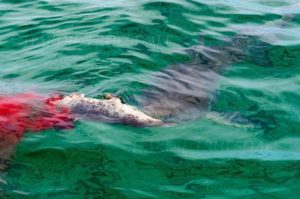
Photo Courtesy of the Atlantic White Shark Conservancy.
CHATHAM – The Atlantic White Shark Conservancy wrapped up their tagging season a few weeks ago, but researchers still have a lot of work ahead.
The winter months bring with them plenty of work to be completed and data to be analyzed.
“The winter is actually an incredibly important and productive time for us,” said Megan Winton, a staff scientist with the Atlantic White Shark Conservancy.
“Right now we are processing all the videos that we collected over the summer, we are analyzing tagging data that the Division of Marine Fisheries has been collecting over the past almost decade,” she said.
“We’re writing paper, we are analyzing all these different data sets we’ve worked really hard to collect to identify trends and patterns in the presence of white sharks off of our coast, as well as figure out where they go when they’re not here.”
Since 2014, research led by the Massachusetts Division of Marine Fisheries and the Atlantic White Shark Conservancy, has been conducted to get a more accurate picture of how many sharks spend their summers on the Cape.
This past tagging season the Conservancy fitted 50 great whites in Cape Cod waters with tracking and data-logging devices and in June they began to conduct new research focused on getting a better understanding of the predatory behavior of white sharks in the region.
“All of the tags that were put out by the Division of Marine Fisheries this summer, they have battery lives of ten years so we will be collecting information on those animals for the next decade,” said Winton.
“That’s going to give us a better understanding of when and where they are feeding off the coast of the Cape and all of that is building of research that has been conducted in previous years.”
Through the research, the Conservancy will be able to identify white shark hot spots and times when risk to recreation water users is at its highest.
“Understanding the research is incredibly important to inform beach management and public safety practices in an area where white sharks are feeding off the coast of the Cape that’s also a really important tourism area,” said Winton.
At the end of the month, researchers will once again hit the waters to retrieve receivers that track sharks in the water. Through this research, crews will be able to tell how many sharks stuck around Cape Cod waters into November and December.
Once the receivers have been hauled and the data analyzed, the Conservancy will update when the last tagged shark was in the area.
Dr. Greg Skomal, a senior biologist with the DMF, said it’s clear that the sharks are feeding in shallow waters, especially following the two shark attacks off the Outer Cape in late summer of 2018.
“It obviously exposes people to some level of risk,” Skomal said.
“We feel that if we can better understand when where and how white sharks attack and kill seals we’ll be able to, perhaps, collect the kinds of information necessary to enhance public safety.”
For more information on the last tagged shark in the area, visit https://www.atlanticwhiteshark.org/.
























